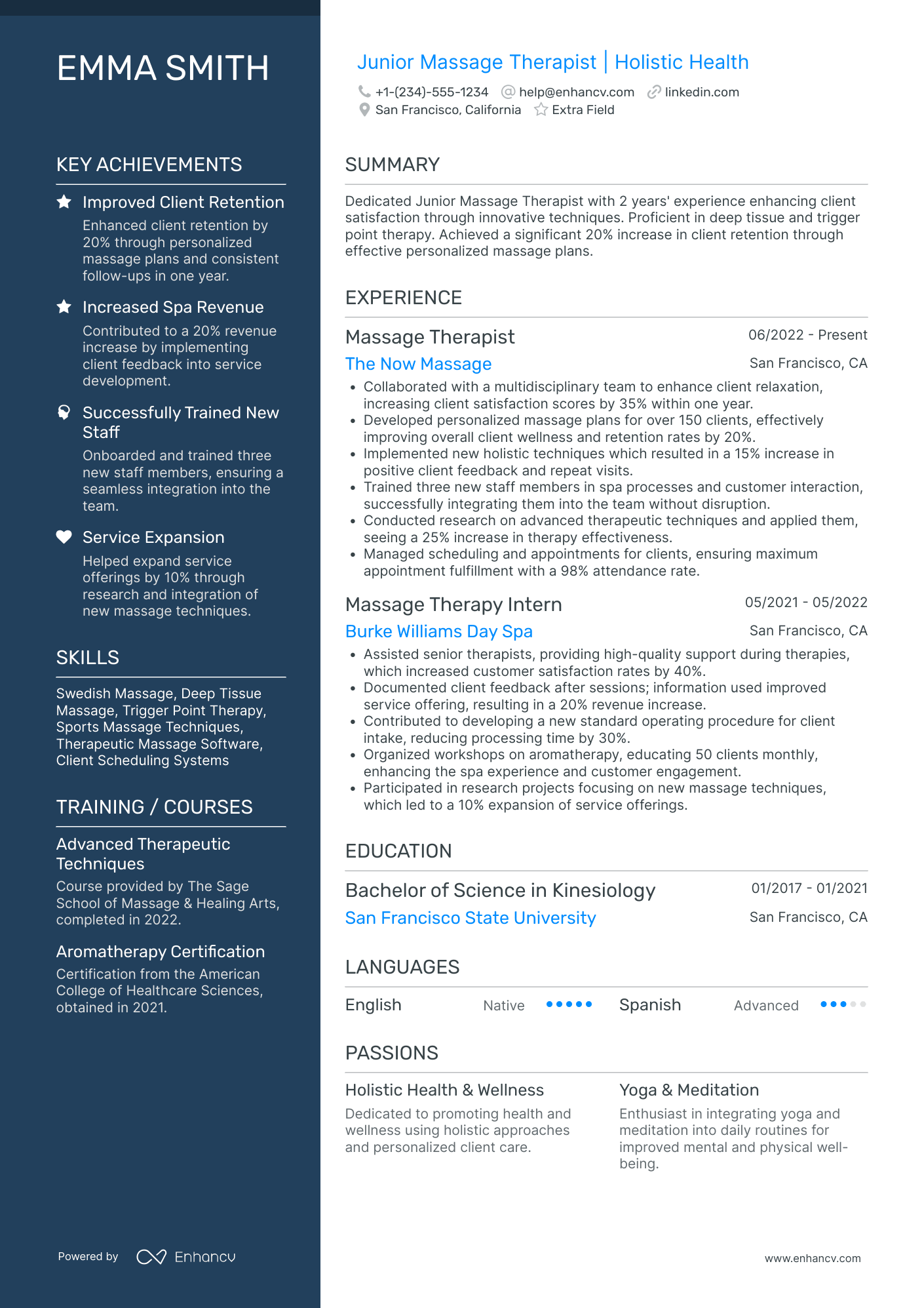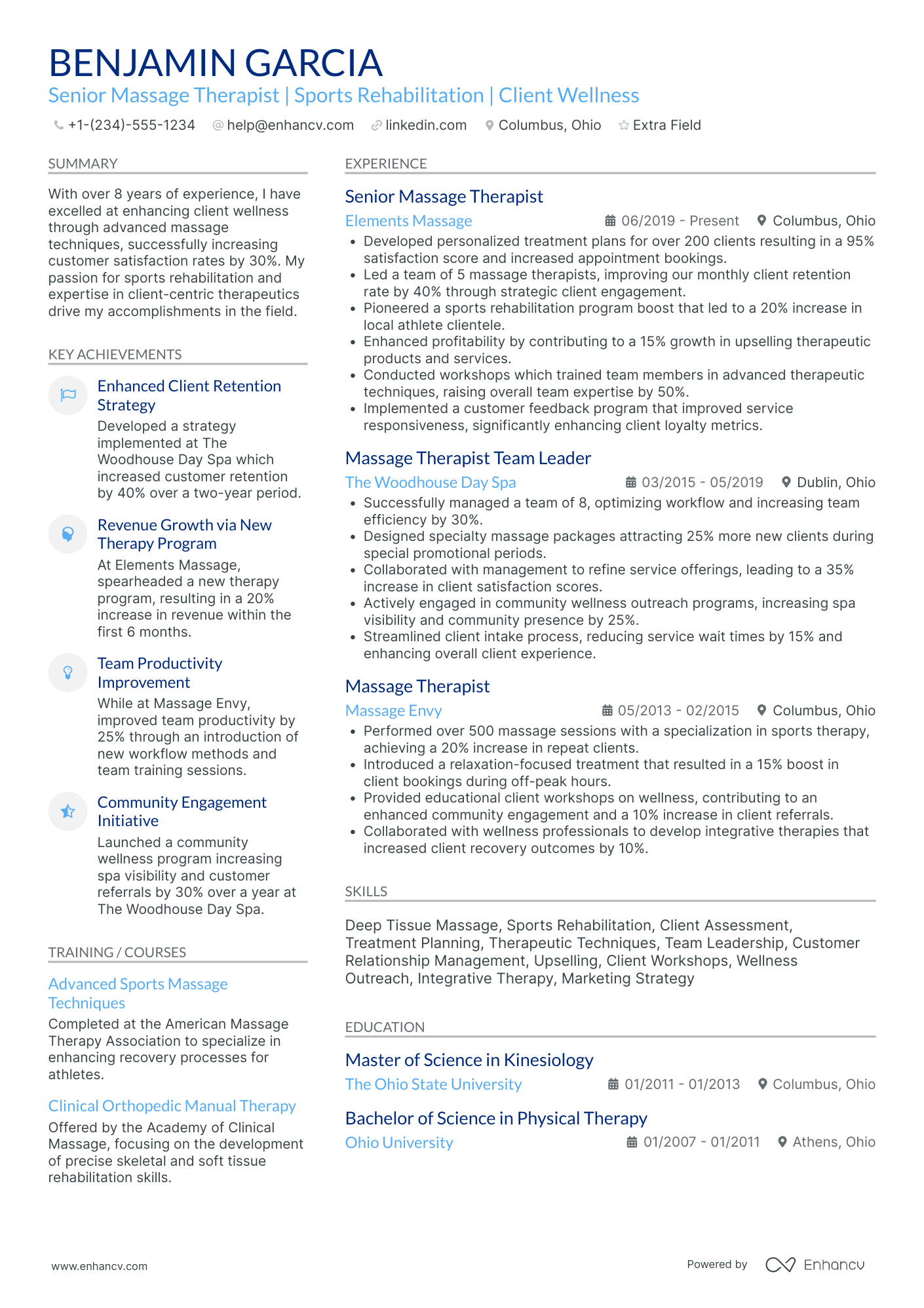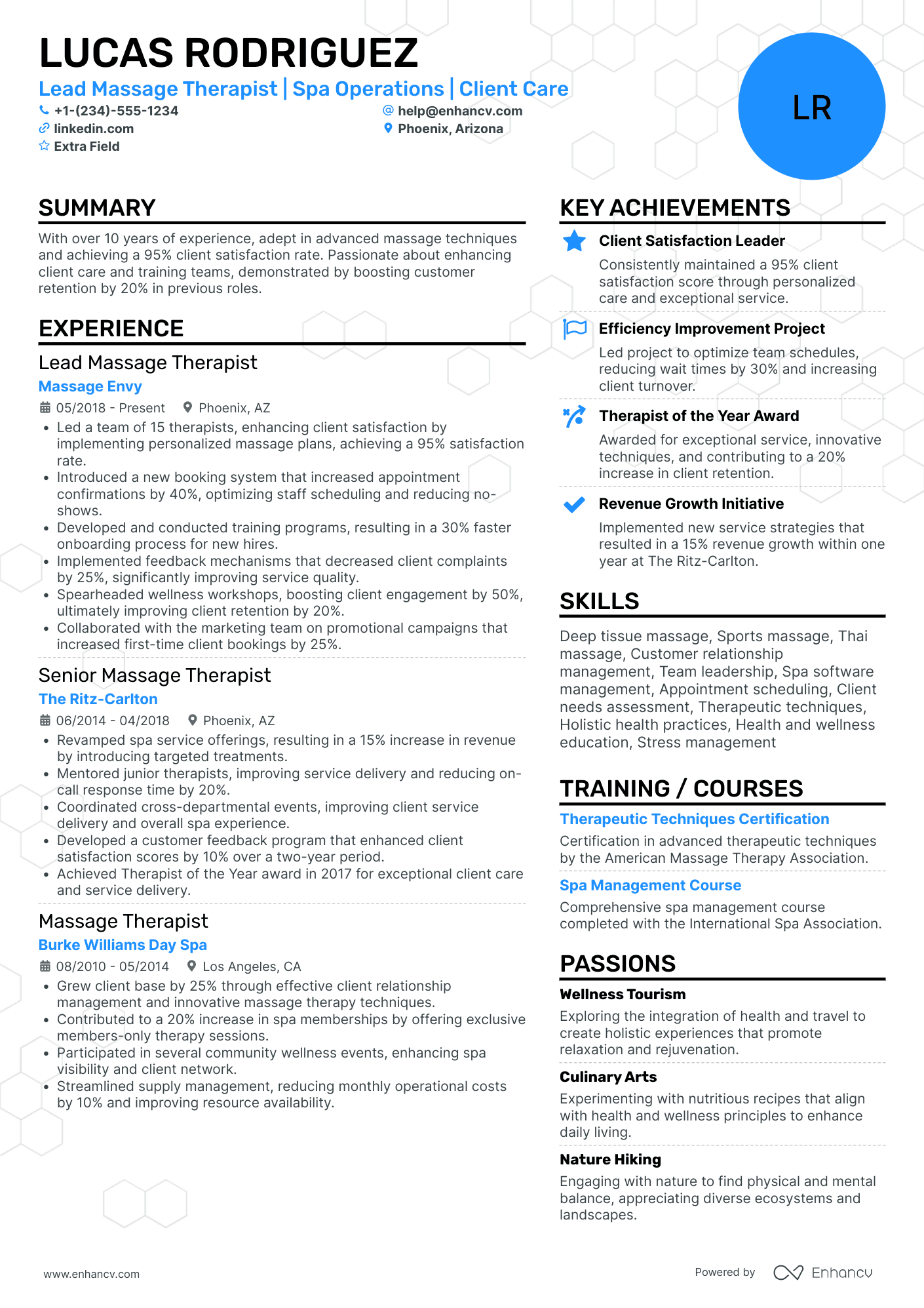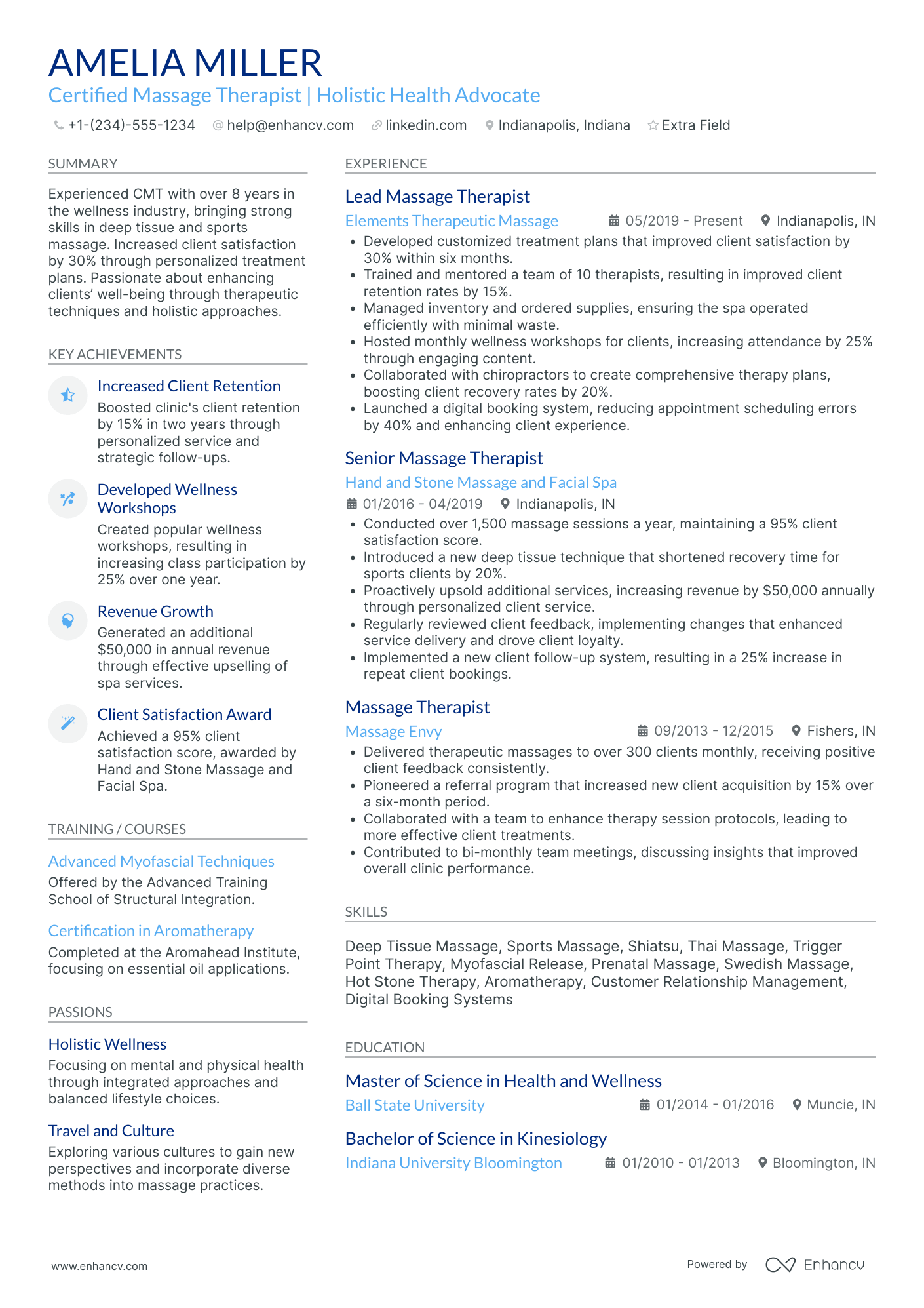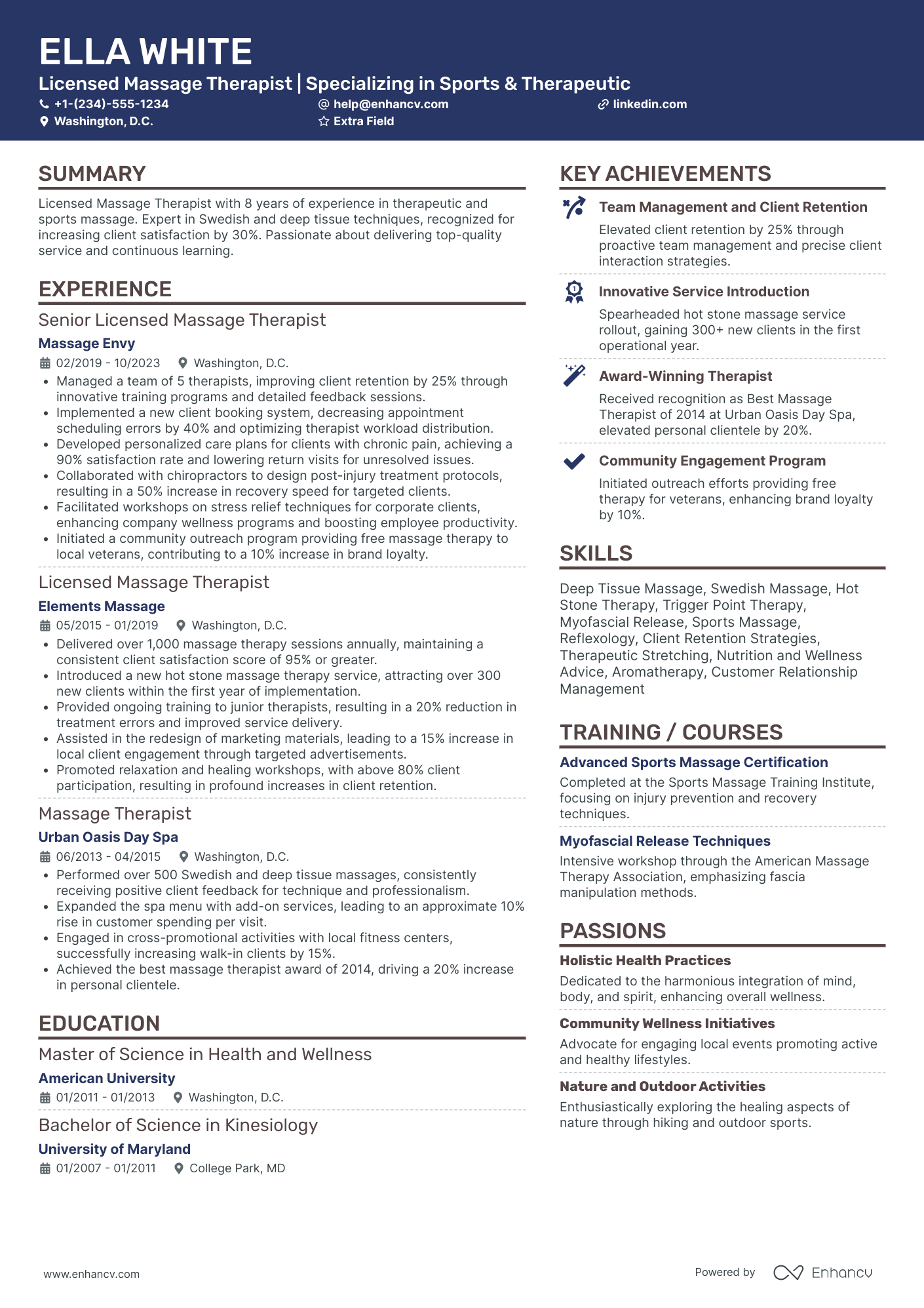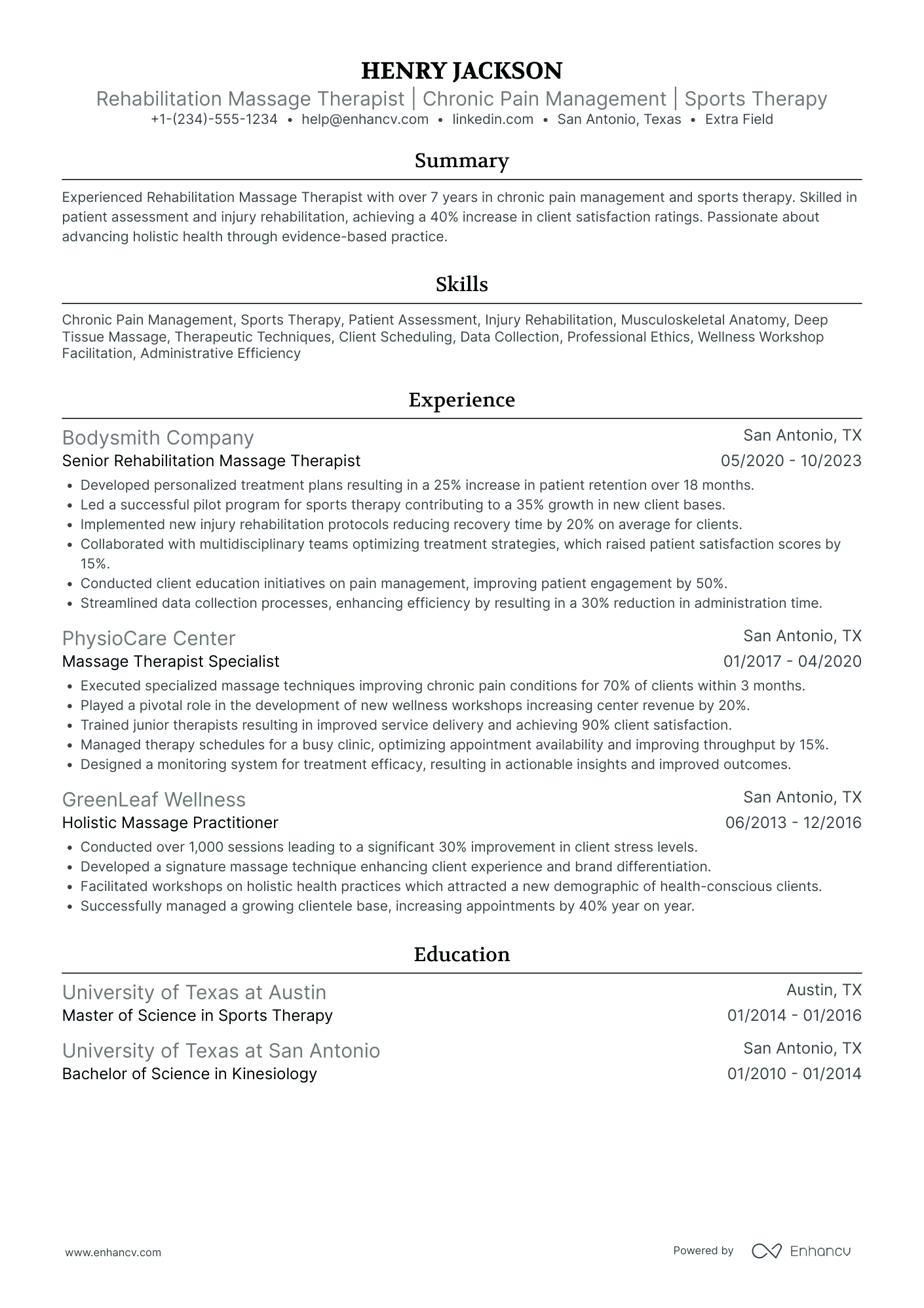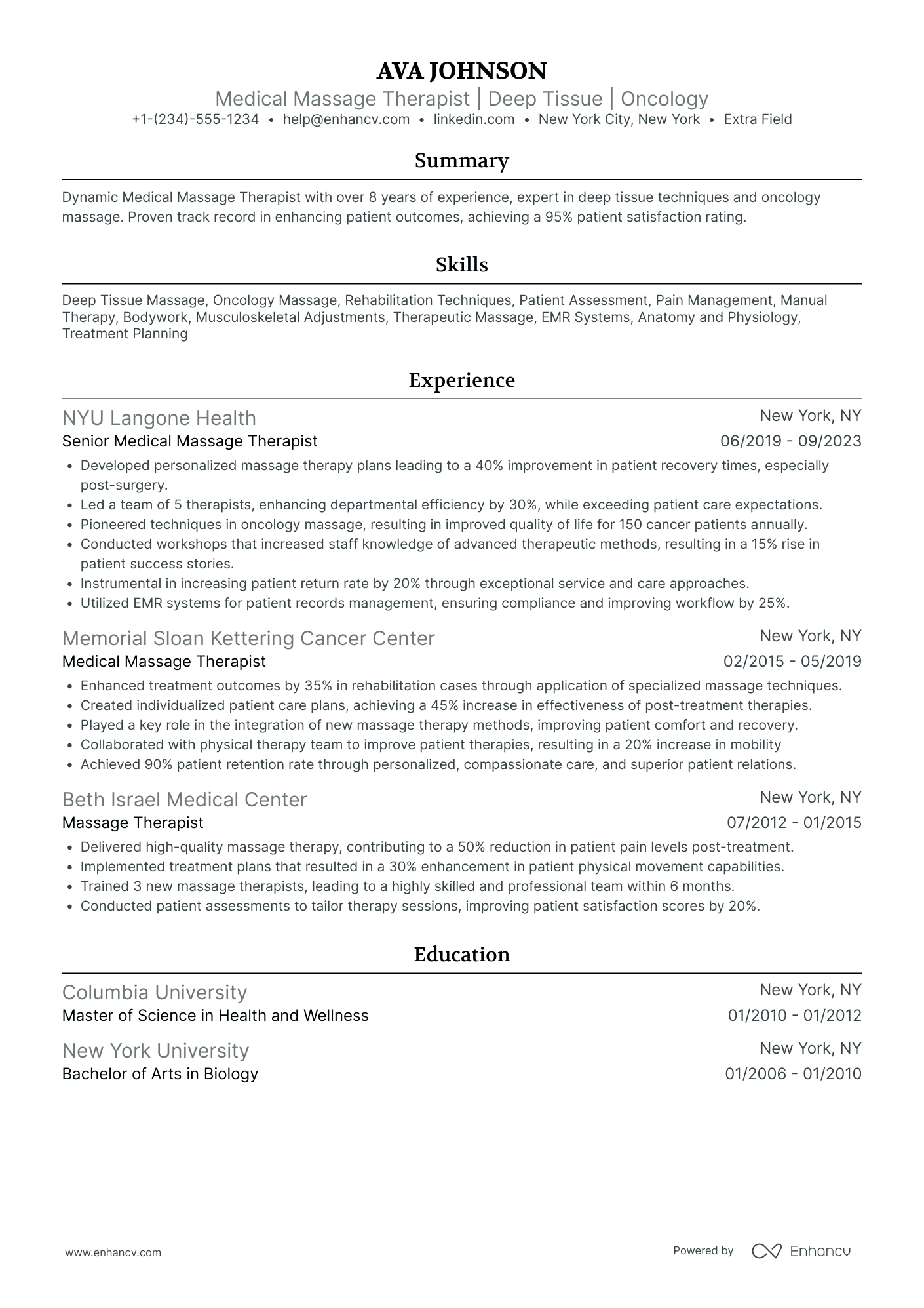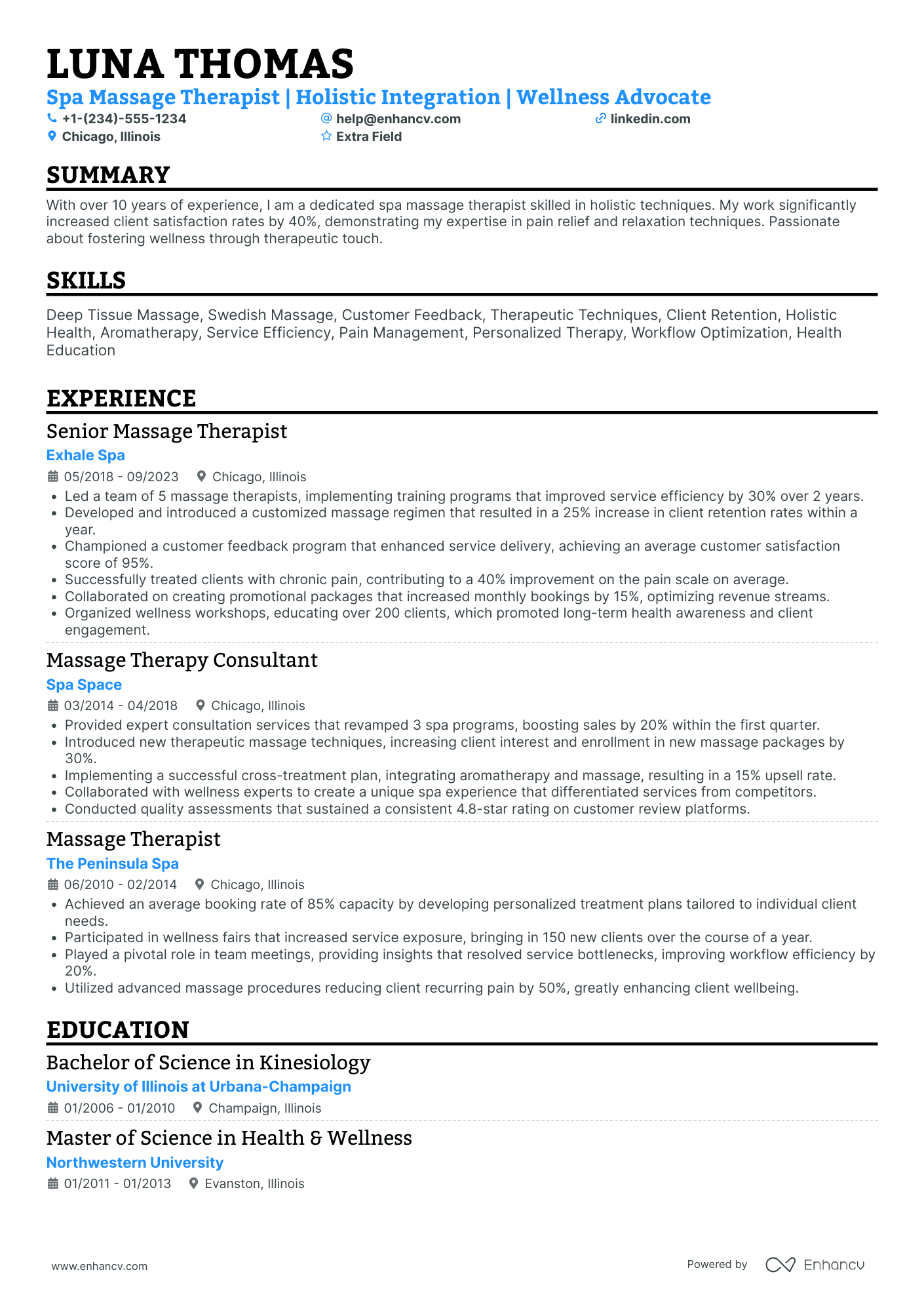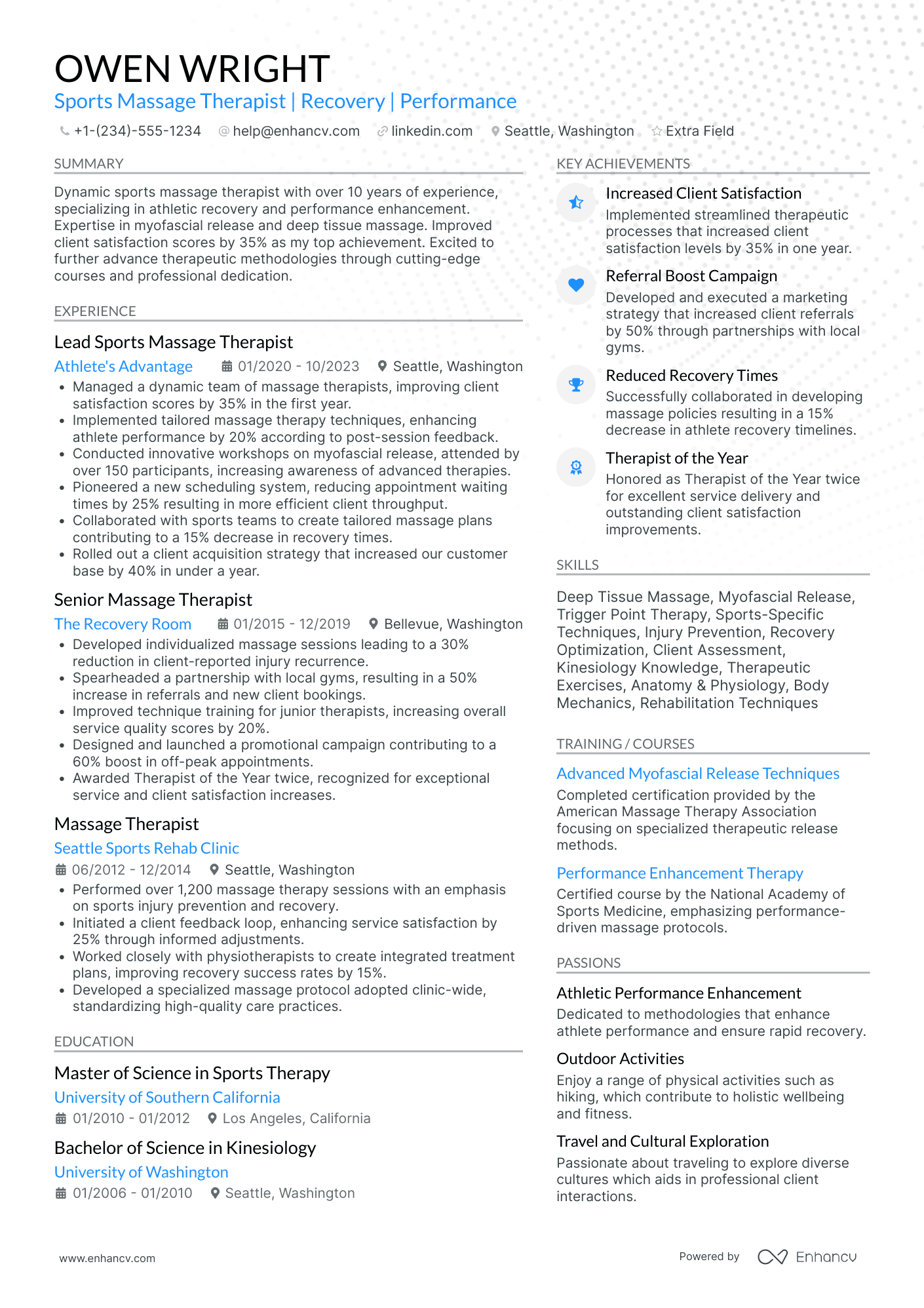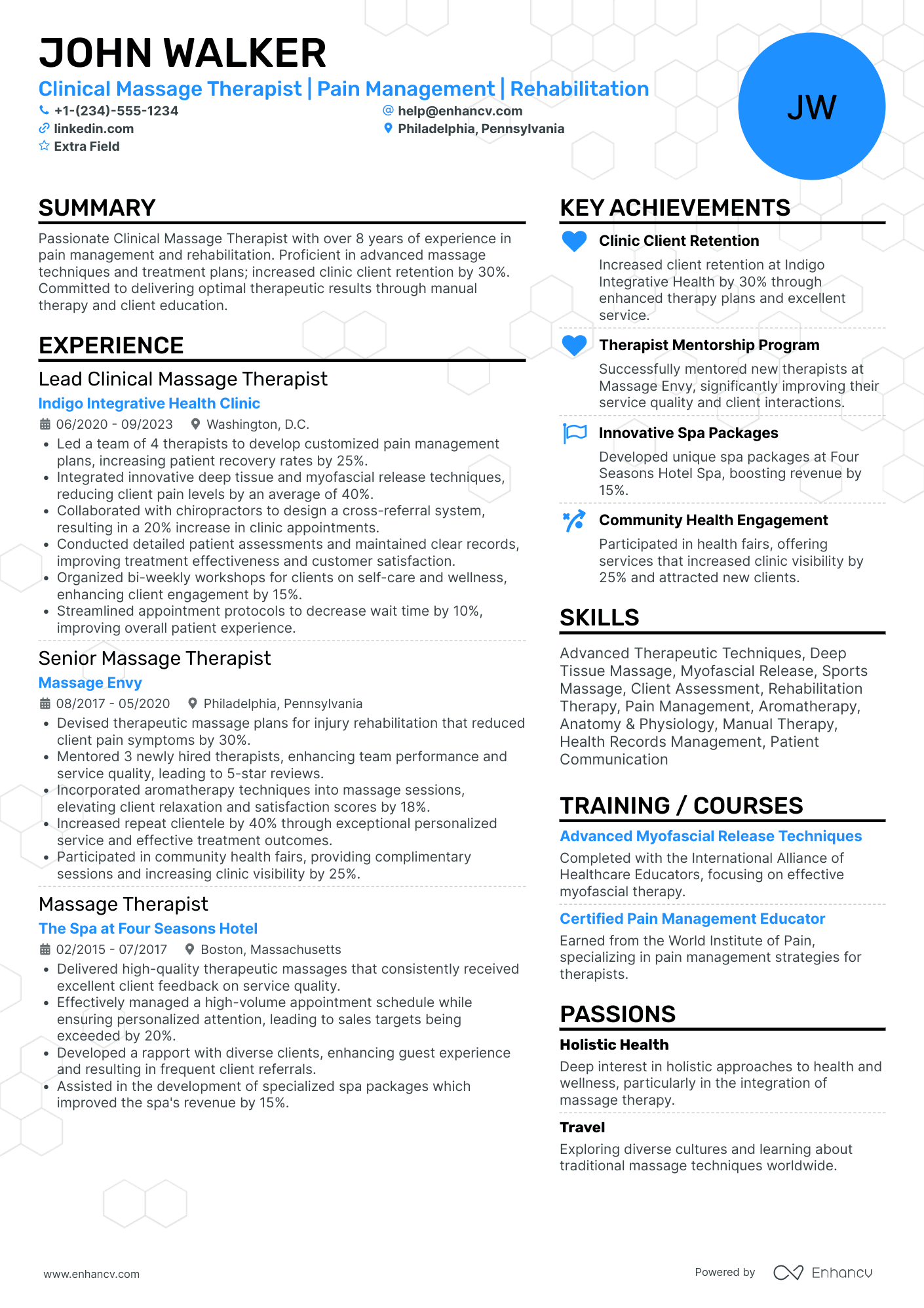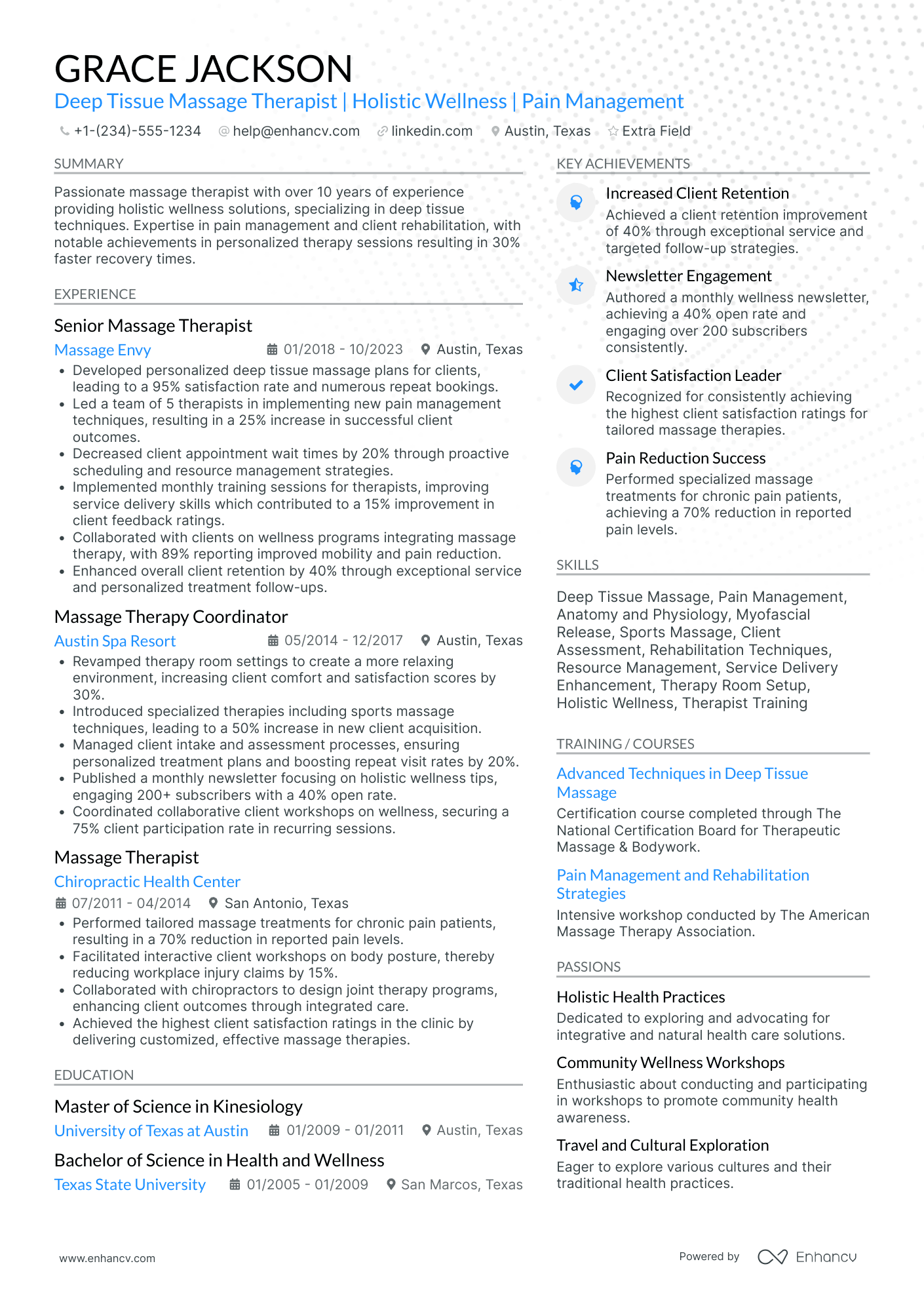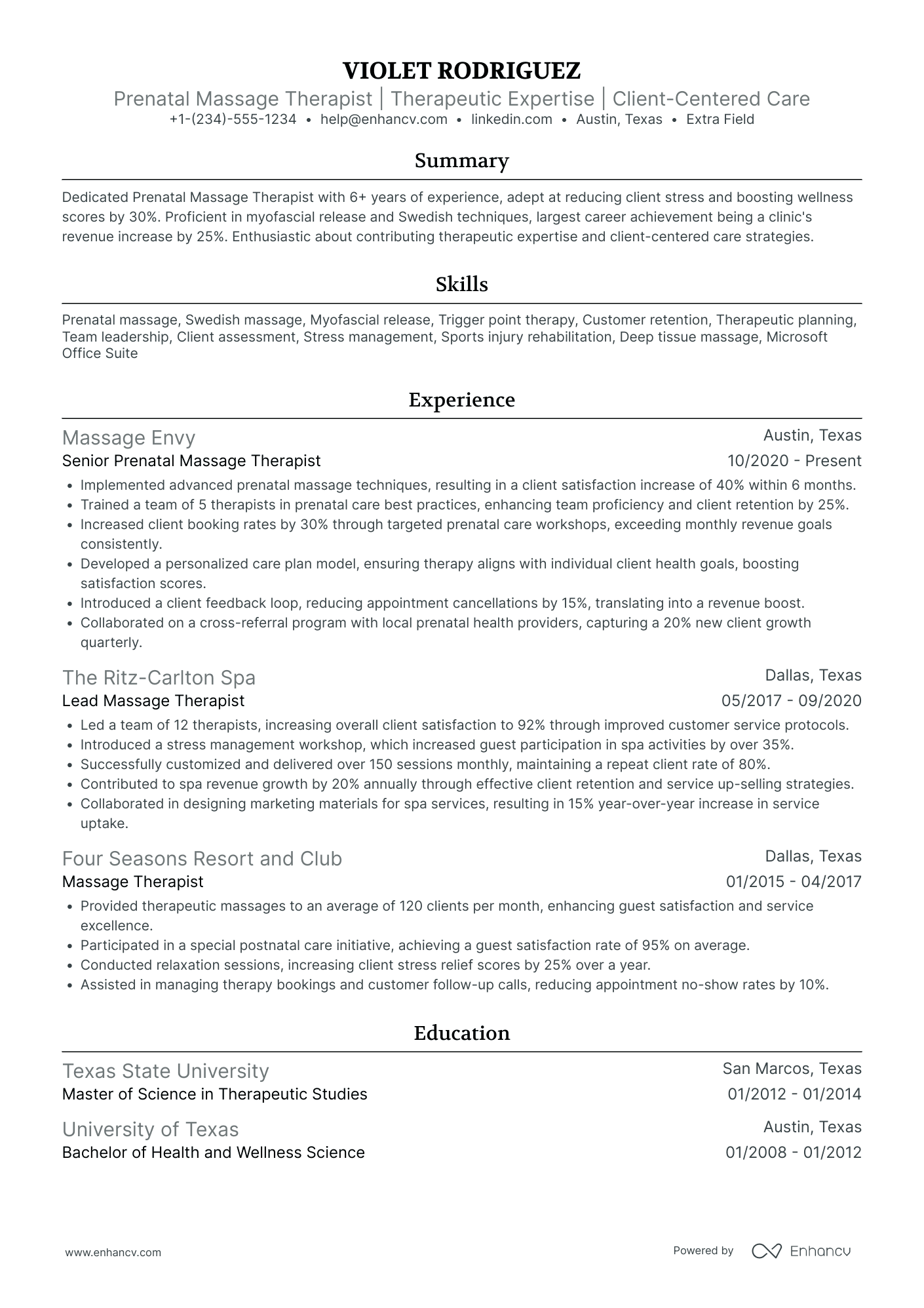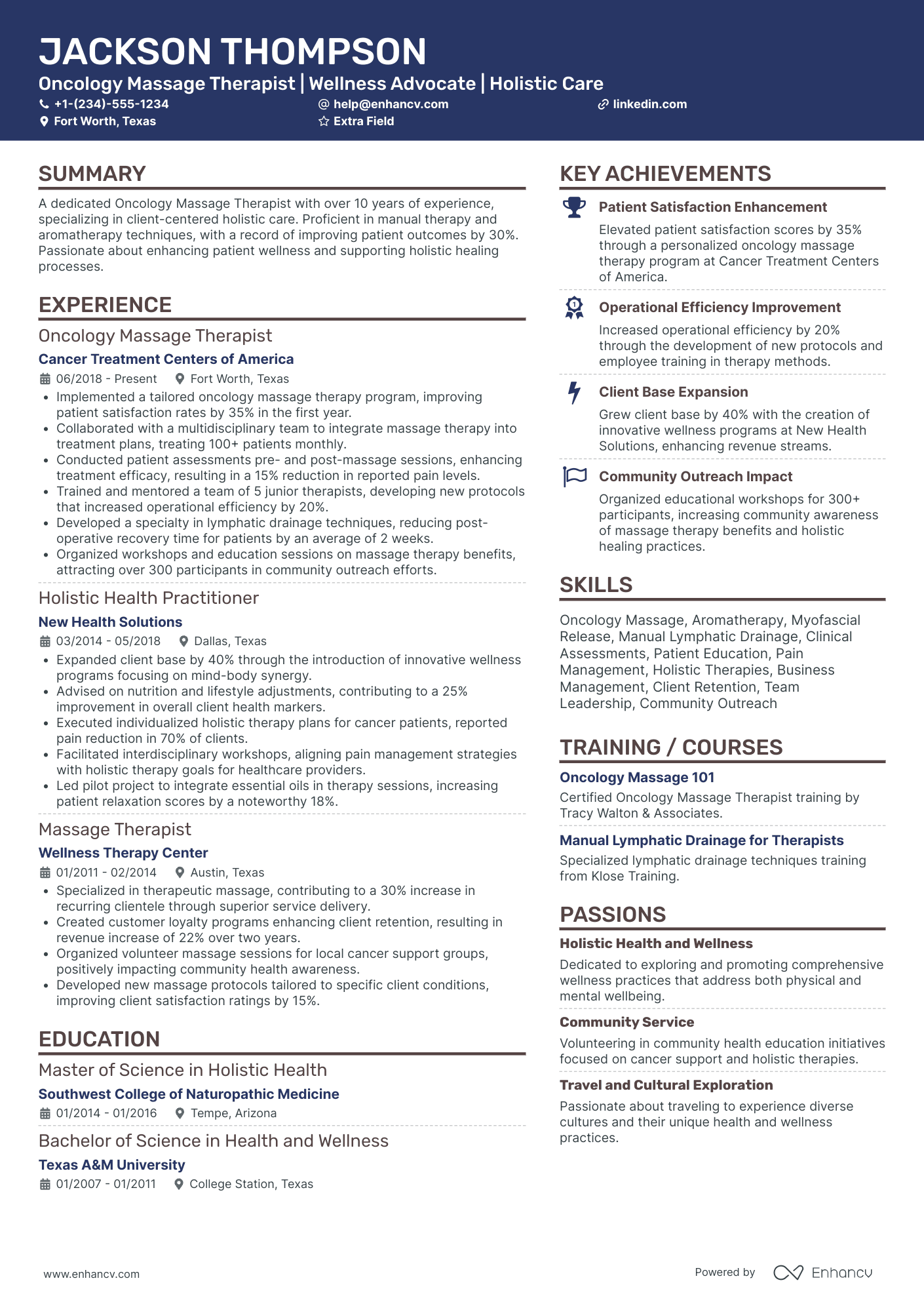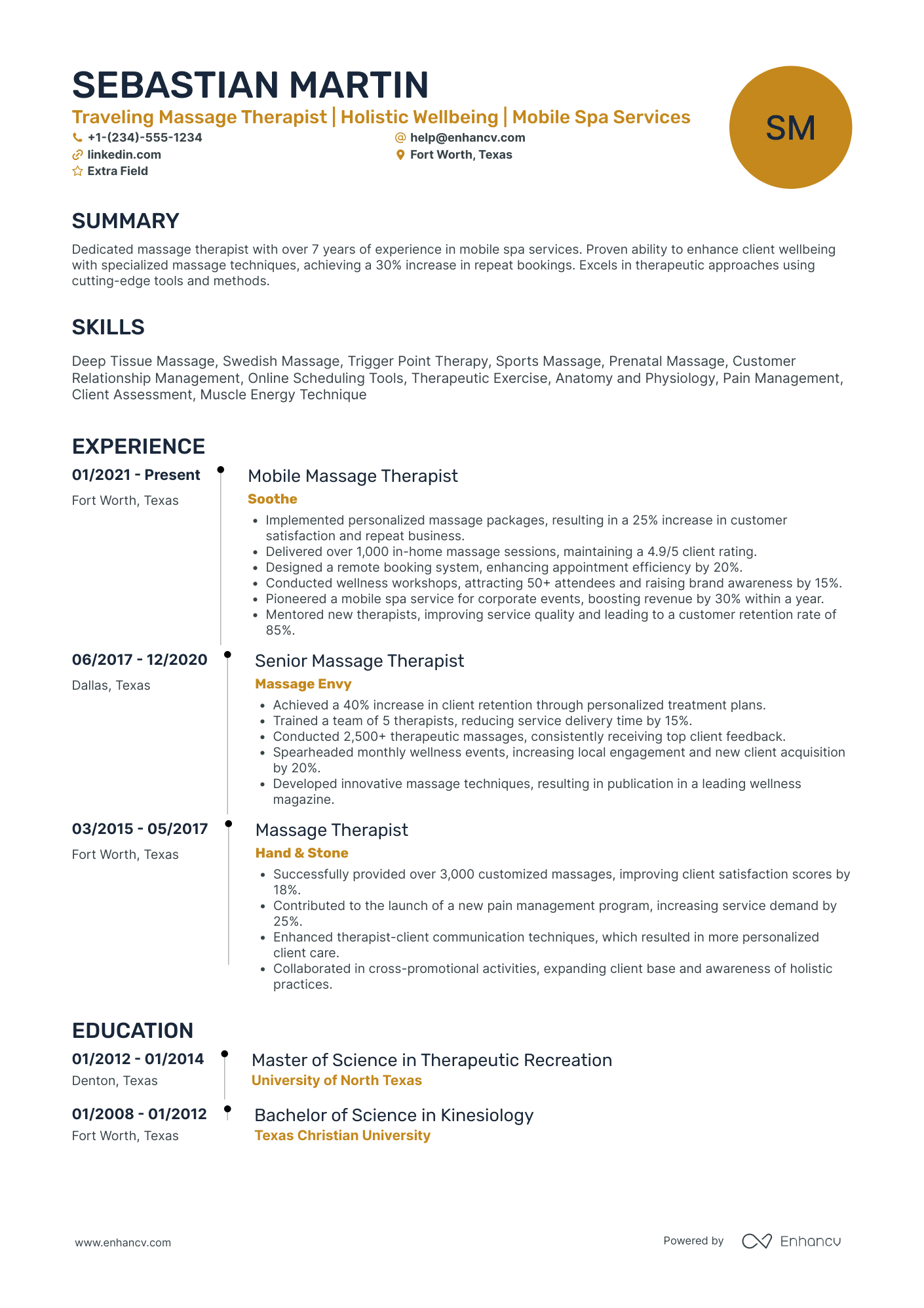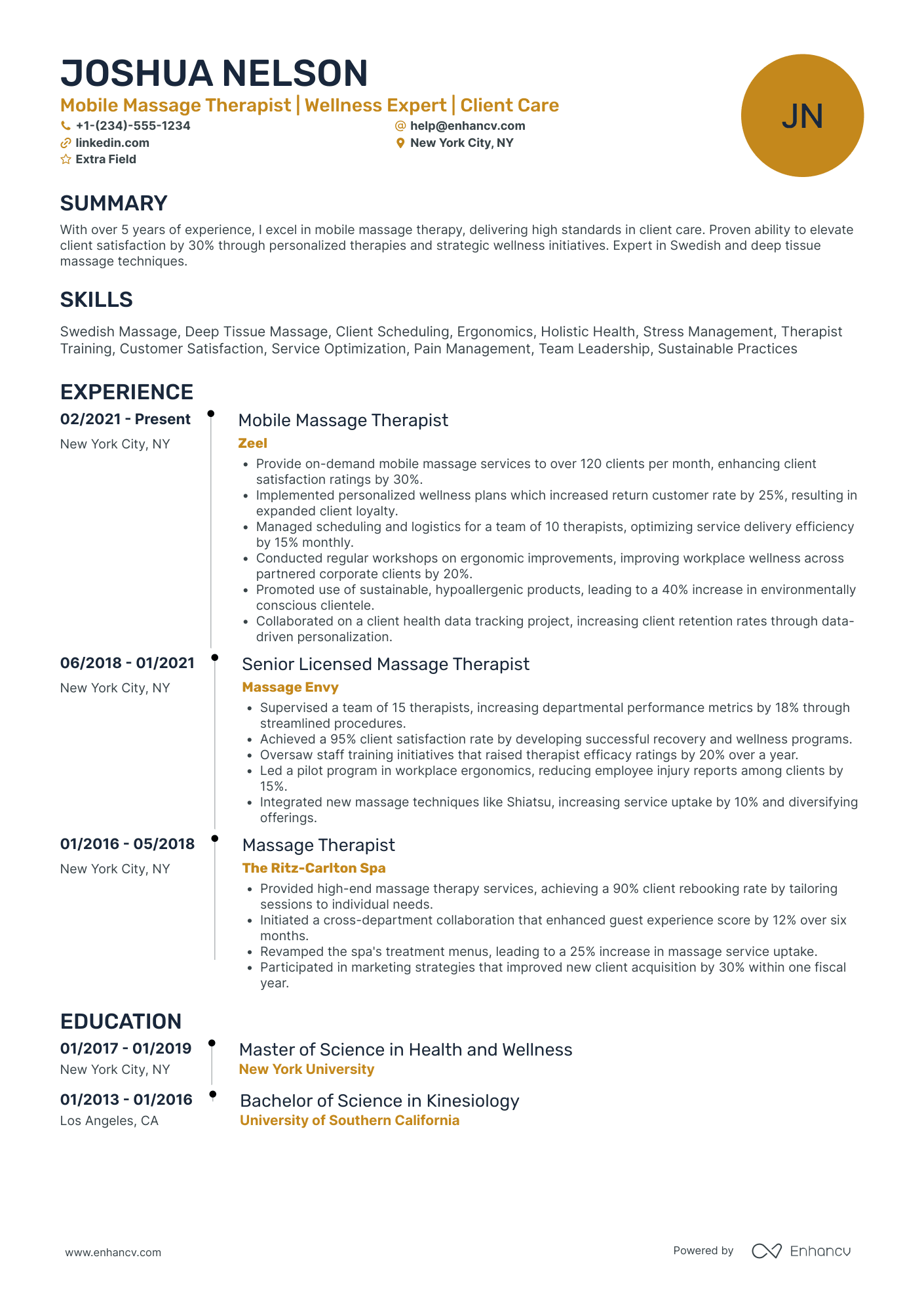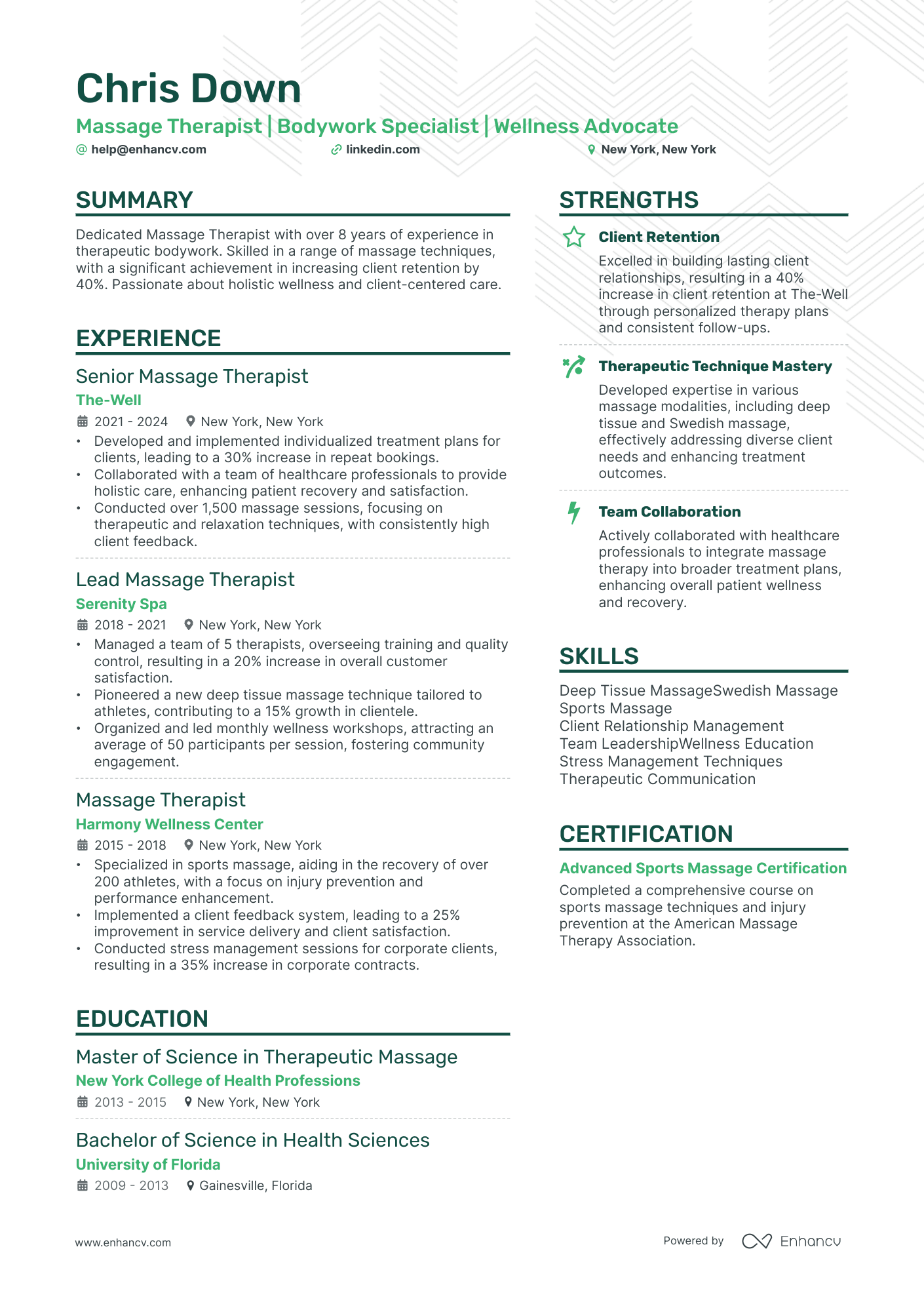Massage therapy is a practical job that relies on hands-on experience and client relationships.
One of the significant challenges of writing a massage therapist resume is capturing a broad range of modalities and experience.
It can be difficult to effectively communicate this skill set on paper without using jargon that may not be understood by a recruiter or hiring manager.
In this guide, you’ll learn:
- How to present client specializations so that hiring managers know you’re the right candidate for the job
- How to include the right combination of skills and techniques that recruiters look for
- How to quantify achievements on your massage therapist resume to highlight success
- How to clearly display credentials and licenses so that potential employers know that you meet the necessary requirements
If you’re looking for something a little different than a massage therapist resume, explore some of our guides for similar roles:
- Health Coach Resume Examples
- Physical Therapist Resume Examples
- Mental Health Coach Resume Examples
- Dietician Resume Examples
Massage therapist resume example
Here’s what this applicant does well in their resume:
- Tailored Experience to the Role: The resume effectively showcases relevant experience in massage therapy, with each role demonstrating progression and specialization in the field. This alignment with the job's requirements makes the applicant's experience particularly compelling.
- Quantifiable Achievements: The inclusion of specific numbers and results, such as increasing client retention by 40% or leading to a 30% increase in repeat bookings, provides concrete evidence of the applicant's effectiveness and skill in their past roles.
- Relevant Education and Certifications: The resume lists a Master's degree in Therapeutic Massage and targeted certifications like Advanced Sports Massage, directly relevant to the massage therapist role, highlighting the applicant's specialized training and commitment to the field.
- Well-Defined Strengths and Passions: The strengths and passions sections are tailored to the massage therapy field, with a focus on client retention, therapeutic technique mastery, and holistic wellness, which are key aspects of being a successful massage therapist.
How to format a massage therapist resume
It is important that your massage therapist resume clearly communicates your skill set and credentials.
The format is the first thing recruiters notice when they look at a resume. Making a good impression starts before they even begin reading.
Proper resume formatting will help to demonstrate your unique training and modalities so that hiring managers can find what they’re looking for quickly.
Here are a few areas to focus on for a massage therapist resume format that recruiters look for:
- Reverse chronological layout - As the name suggests, a reverse chronological layout focuses on your work experience in reverse chronological order. Show that you have a proven track record of hands-on experience as a massage therapist and a client satisfaction history.
- Professional header - Include a header at the top of your resume that clearly states your title and professional contact information. Tailor your resume to your target job by including the specific modality or specialization they’re looking for in your header.
- Single page - Potential employers will have tons of applications to sort through. Save them time by keeping every section of your resume short, concise, and relevant to your massage therapy achievements.
- ATS optimized - Select fonts and file formats that are optimized for Applicant Tracking Systems. Use ATS-friendly fonts like Rubik and Montserrat and a PDF file format in Enhancv’s resume builder to give your massage therapist's resume the best chance of making it to a human recruiter.
Different regions expect different formats – Canadian resumes, for example, may look unique.
Is your resume good enough?
Drop your resume here or choose a file. PDF & DOCX only. Max 2MB file size.
The top sections on a massage therapist resume:
- Contact Information: It allows recruiters to reach you readily for further discussions or job offers.
- Certification and Licenses: It's essential to prove you possess the relevant certifications as a massage therapist, verifying your skills.
- Specialized Skills: This shows the unique massage techniques or therapeutic practices you're trained in that will set you apart from other candidates.
- Professional Experience: Here, you detail your past work history in massage therapy, showing your familiarity and strengths in the field.
- Client Testimonials: Positive feedback from satisfied clients can significantly enhance your credibility and illustrate how your services have benefited others.
What recruiters want to see on your resume:
- Verification of License and Certifications: The importance of this lies in its legal requirement for practice, validating professional knowledge and adherence to industry standards.
- Hands-on Experience: Practical experience and amount of time spent in the industry can be an indicator of skill level and ability to handle diverse client needs.
- Knowledge of Different Massage Techniques: As different clients might require different techniques, a variety of knowledge showcases flexibility and versatility.
- Client Satisfaction History: Testimonials or references from satisfied clients provide clear proof of providing quality service and a strong work ethic.
- Physical Stamina and Strength: Massage therapy is physically demanding, therefore physical endurance reassures recruiters of your capability to handle back-to-back sessions efficiently.
How to write your massage therapist resume experience
The experience section of your resume lists your work history along with 3-4 bullets highlighting your top accomplishments in the role. Show potential employers what you’ve achieved as a massage therapist so they can see how you’ll impact success at their organization.
Hiring managers don’t just want to see a list of roles and responsibilities. Highlight client satisfaction and industry achievements to show what makes you the right candidate.
Let’s look at an example of a massage therapist's resume experience section.
- •Provided Swedish, deep tissue, and other massage types
- •Built strong relationships with clients
- •Balanced schedule to provide care for multiple clients
What doesn’t work in this example:
- General responsibilities - “Provided Swedish, deep tissue, and other massage types” is a vague generalization that doesn’t tell hiring managers specifically what techniques the candidate knows, or whether they are actually good at them.
- Lacks evidence - “Built strong relationships with clients” expects the potential employer to just take the candidate’s word for it. Provide evidence of client satisfaction with testimonials and measurable data.
- No numbers or metrics - “Balanced schedule to provide care for multiple clients” doesn’t provide any specifics on the number of clients or the candidate’s organizational skills. Use numbers on your resume whenever possible to show real examples of success.
Let’s make a few changes to this massage therapist experience section and take another look.
- •Provided Swedish, deep tissue, and prenatal massage to 250+ clients
- •Maintained a 98% client satisfaction score with a 40% client retention rate
- •Implemented a new scheduling system, resulting in a 25% growth in clientele
What works in this example:
- Specific skills - Potential employers may be looking to fill a slot with a massage therapist who is trained in specific techniques. “Provided Swedish, deep tissue, and prenatal massage to 250+ clients” shows companies the hands-on experience this candidate has.
- Client satisfaction - Massage therapy is a role that relies on customer satisfaction. "Maintained a 98% client satisfaction score with a 40% client retention rate" tells potential employers what they can expect from this candidate.
- Quantifies success - "Implemented a new scheduling system, resulting in a 25% growth in clientele" demonstrates measurable success this candidate has achieved and showcases client management skills.
How to quantify impact on your resume
Demonstrating measurable success for a practical job like massage therapy can be difficult.
It’s important to quantify achievements on your massage therapist resume so potential employers see how you will impact success at their organization.
Sharing specific accomplishments without violating client confidentiality can be a particular challenge.
Consider the following areas when determining how to incorporate real numbers and data on your massage therapist resume:
- Include the number of clients handled per day: This shows your ability to manage workload and efficiency in a busy environment.
- Mention the diverse range of techniques you are skilled in: Offering a variety of techniques demonstrates your adaptability and extensive knowledge.
- List how many years of experience you have in massage therapy: This shows your exposure to the job and your consistency in the profession.
- Indicate the number of licenses and certifications gained: This emphasizes your commitment to professional development and mastery of various techniques.
- State your client retention rate: A high retention rate indicates good interpersonal skills and high quality of service.
- Note an increase in clients under your service, if applicable: A growing client base could demonstrate successful marketing efforts or client satisfaction.
- Indicate the number of back-to-back sessions you can handle: This shows physical endurance, organizational skill, and time management.
- Specify the volume of repeat customers: A high number of repeat customers can indicate a high satisfaction level and trust among your clients.
How do I write a massage therapist resume with no experience
As the saying goes, everyone has to start somewhere. If you’re just breaking into massage therapy or are making a career change, you face the challenge of writing a massage therapist resume with no experience.
The best way to approach this task is to write a functional resume that focuses on transferable skills rather than experience.
Highlighting transferable skills shows potential employers how you’ve developed the skills necessary for the role outside of work experience.
Follow these steps to writing an effective massage therapist resume with no experience:
- Choose a functional resume layout
- Focus on transferable skills
- Present credentials and licenses clearly
- List professional affiliations and certificates in specializations
- Tailor every section to fit your target job
Don’t pad your experience section with irrelevant jobs just to fill space. Only include roles that are relevant to your target position and focus on transferable skills.
Jobs in similar bodywork roles or health and wellness are a great way to show transferable skills. Even jobs in customer service can be an opportunity to highlight client satisfaction skills.
How to list your hard skills and soft skills on your resume
A challenge for massage therapists is striking the right balance between technique training and the skills required to interact with clients. You need to be competent in massage techniques to provide professional care as well as customer service to address client needs.
Skills on your massage therapist resume will appear in two major categories.
Hard skills are the technical knowledge and abilities needed to perform job duties, whereas soft skills are the interpersonal and communication skills needed to interact with others.
Hard skills like software and techniques tend to be straightforward and don’t require an explanation. They can be presented in list form.
Here is an example of hard skills on a massage therapist's resume.
Only include hard skills that are relevant to your target job and that you’re confident in. If you’re listing it on your resume, hiring managers will assume you’re proficient.
Here are a few more hard skills to consider for your massage therapist resume.
Best hard skills for your massage therapist resume
- Swedish Massage Technique
- Deep Tissue Massage
- Hot Stone Massage
- Reflexology
- Aromatherapy
- Neuromuscular Massage
- Thai Massage
- Sports Massage
- Shiatsu Massage
- Prenatal Massage
- Myofascial Release
- Trigger Point Therapy
- Lymphatic Drainage Massage
- Craniosacral Therapy
- Understanding of Human Anatomy
- Understanding of Physiology
- First Aid Certified
- CPR Certified
- Knowledge of Spa Software
- Proficiency in Electronic Health Records
Soft skills can be open to interpretation and therefore require some explanation. You don’t want hiring managers to make their assumptions.
The best way to do this is by highlighting your top soft skills with specific examples and achievements.
Here is an example of a massage therapist's soft skills section.
Highlighting accomplishments that showcase your soft skills is a great way to present your client satisfaction expertise to potential employers.
Here are a few more soft skills to consider for your massage therapist resume.
Best soft skills for your massage therapist resume
- Excellent Communication
- Customer Service Skills
- Compassionate Nature
- Patient Listening
- Intuition on Clients Needs
- Physical Stamina
- Emotionally Intelligent
- Problem Solving Aptitude
- Aptitude for Creativity
- High Level of Professionalism
- Great Organizational Skills
- High Levels of Empathy
- Ability to Multitask
- Interpersonal Skills
- Self-motivation
- Time Management Skills
- Stress Management Capabilities
- Attention to Detail
- Adaptability
- Respect for Client Privacy
How to list your certifications and education on your resume
It is important to provide precise details about massage therapy licensure, certifications, and continual education, which vary greatly from state to state and country to country.
Requirements in your area might include completing a state training and licensure program.
There typically are no formal degree requirements to become a massage therapist, though training programs may require a high school diploma for entry.
Let’s look at an example of a massage therapist's resume education section.
Your education section should include:
- Name of institution
- Name of degree
- Years attended
Only include your high school diploma if it is your highest level of education. If you have earned a higher degree in a relevant field, include it instead of your high school diploma.
Your certification section will also be concise. Your massage therapist certification section only needs to include the name of the certificate and the issuing institution.
Be sure to research certification requirements in your state and specialty.
Here is an example of a certification section on a massage therapist resume.
Continuing your education and gaining additional certificates in massage techniques and modalities is a great way to keep your resume relevant and increase your employability.
Here are a few more certifications to consider for your massage therapist resume.
Best certifications for your massage therapist resume
How to write your massage therapist resume summary or objective
A summary or objective is an opportunity to introduce yourself and your value in the industry as a massage therapist. It captures your career history and top accomplishments in 3-4 sentences.
Though the terms are often used interchangeably, there is a slight difference between a summary and an objective.
A summary is a brief introduction that summarizes your career and top achievements. An objective looks to the future and captures what you are hoping to achieve in your new position.
A summary is more suitable for candidates with experience in the field. Entry-level candidates are more likely to focus on an objective.
If you have at least some massage therapy experience, combine them by writing an introduction, a career highlight, and a goal you share with your target employer.
Let’s take a look at an example of a massage therapist resume summary.
What doesn’t work in this example:
- Unclear training - This candidate mentions having “training in a variety of techniques” but does not explicitly state which ones. Be clear in your credentials so potential employers know that you have the qualifications they’re looking for.
- General statements - “Passionate about building client relationships” is a blanket statement that doesn’t communicate anything of value about the candidate. Use specific achievements to show how you will impact success in your target job.
- No specific goal - “Seeking new opportunity as Lead massage therapist” doesn’t show how the candidate’s and the organization’s goals align. You don’t want potential employers to get the impression that you’re mass-emailing your resume.
Let’s make a few changes to this massage therapist summary and take another look.
What works in this example:
- Strong introduction - "massage therapist with 10 years of experience in deep tissue and sports massage” tells hiring managers this candidate’s specific experience and skills right away.
- Evidence of success - “Maintained a 95% client satisfaction score with a 40% retention rate” demonstrates how this candidate’s skill set has resulted in measurable results.
- Clear objective - “Seeking an opportunity to implement sports massage services as Lead massage therapist at BodyHealth Club” showcases how this candidate’s specific experience will impact success at their target company.
Optimize your resume summary and objective for ATS
Drop your resume here or choose a file.
PDF & DOCX only. Max 2MB file size.
Additional sections for a massage therapist resume
Not everyone follows a traditional career path. If you’ve developed massage therapy skills in ways outside of the standard sections, you may want to find other ways to incorporate them into your resume.
Additional sections on your resume can be a great way to show how you’ve developed massage therapy skills in unique ways.
Here are a few sections to consider adding to your massage therapist resume:
- Professional Affiliations - Finding a place for relevant professional affiliations like membership with the Associated Bodywork & Massage Professionals (ABMP) or American Massage Therapy Association (AMTA) and any roles held within these organizations can be quite tricky. Providing supplemental information with an additional section may be the right strategy for you.
- Continuing Education - Continuously developing your skills as a massage therapist with new techniques and modalities is a great way to keep your resume relevant and increase your employability. Be sure to keep your massage therapist resume up-to-date and show commitment to your role by always updating it to reflect your current skill set.
- Volunteer Work - Volunteering is a great way to develop soft skills necessary for massage therapists like communication, emotional intelligence, and stress management.
Key takeaways
You’re just about ready to send off that amazing massage therapist resume! Before you go, let’s review a few key takeaways for creating an effective resume.
- Format your massage therapist resume in a way that is clear and concise so that recruiters find the information they’re looking for quickly.
- Quantify the impact on your massage therapist resume by highlighting measurable results with real numbers and data.
- Tailor your resume to your target job by focusing on your specific credentials and expertise in massage techniques.
- Research certification and licensure requirements in your area and prominently display your education on your resume so that hiring managers know you meet the requirements.
Massage Therapist resume examples
By Experience
Junior Massage Therapist
Senior Massage Therapist
Lead Massage Therapist
By Role
